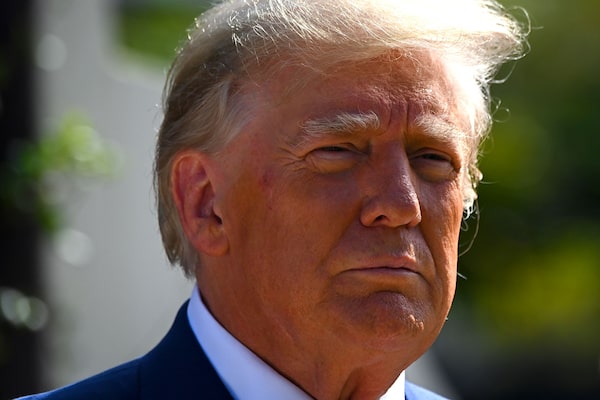
Donald Trump speaks to the media while departing a polling station after voting in the U.S. midterm elections in Palm Beach, Fla., on Nov. 8, 2022.EVA MARIE UZCATEGUI/AFP/Getty Images
In 1785, the veterans of the fur trade founded a group known for its feats and its feasts – and for 40 years, the Montreal-based Beaver Club, one of the most colourful fragments of long-ago Canadiana, flourished under its motto Fortitude in Distress. At the distance of more than two centuries and 2,500 kilometres, Donald Trump plans to use his Mar-a-Lago club as the venue for displaying his own fortitude in distress.
Family members wish he wouldn’t. Party leaders have begged him to demur and defer. The public’s support of him is abysmal. The results of last week’s midterm congressional elections suggest he may be a spent force.
All the more reason, the man who flourishes in distress seems to be telling himself, to plow ahead Tuesday with formally announcing that he will undertake a third campaign for the White House.
With federal and state prosecutors preparing legal cases against him; with his onetime Florida protégé flexing his political muscles after a landslide gubernatorial re-election victory; with Republican presidential hopefuls on his right and left preparing their own campaigns; and with his media allies in the Fox News/Murdoch orbit fleeing from him at hypersonic speed, Mr. Trump may be feeling more than simple distress. He may also be acting out of desperation.
To stave off his gathering legal problems, he may need another presidential campaign; no ex-president has been indicted for criminal conduct, and the awkwardness of legal action being pursued against a presidential candidate may forestall an indictment.
To counter the congressional committee examining the Jan. 6, 2021, insurrection at the Capitol, Mr. Trump may need to have a new object for his attention; the panel’s report, expected within weeks if not days, almost certainly will excoriate the former president and formally accuse him of fomenting an insurrection against his own government.
To assure that his money machine still churns with fresh infusions of cash, he may need to give donors a new outlet for spending; political fundraising is like the lateral movement of the mako shark, requiring movement (or in Mr. Trump’s case, a movement) to receive life-preserving oxygen.
Lawrence Martin: The U.S. midterm elections could be a death knell for Trump
To change the subject from the astonishing failures of his hand-picked candidates to create a “red wave” of Republican victories last week, he may need the fresh start that a new campaign provides; otherwise, newspaper columns and cable gabfests will continue to emphasize the flight from his pillar and shield, once so powerful and now seemingly so ineffective.
But the Republican desire for a fresh start is not confined to the former president.
Many Republicans want a new face to take the baton of Mr. Trump – the drive to win the allegiance of the blue-collar voters, who since the Franklin Roosevelt New Deal were the electoral base of the Democrats, and to speak for the dispossessed and those left behind in the new economy. Those twin roles once were the principal element of the Democratic playbook that controlled the House of Representatives for the 40 years leading to 1995.
Moreover, some of the newly elected Republican lawmakers in the House want a fresh start and a fresh agenda – one that makes Mr. Trump look like a figure from a fast-receding yesterday and that endangers the fervent desire of Representative Kevin McCarthy to be elected speaker even if the unresolved congressional races result in a GOP majority.
Mr. Trump’s likely presidential announcement Tuesday and a new fundraising offensive face strong headwinds.
A formal announcement will not change the results of the CNN exit poll last week showing that 58 per cent of voters said they had an unfavourable view of Mr. Trump. Nor will a bravura performance Tuesday wipe away the final NBC midterm poll that found that only 30 per cent of Republican voters – a new low – said they were more supporters of Mr. Trump than of the Republican Party more broadly.
The road to become just the second three-time Republican presidential nominee – only Richard Nixon (1960, 1968, 1972) has been able to achieve that – is full of obstacles, many of them of his creation.
Already, Republican rivals are lining up to blunt his effort to become only the second president to serve nonconsecutive terms – Grover Cleveland, elected in 1884 and then again in 1892 is the only example – and to capture the GOP nomination for themselves.
And the prospect of another Trump campaign against Joe Biden – the first presidential rematch since 1956, when Dwight Eisenhower faced Adlai Stevenson for the second time – pleases almost no one, according to every poll that has tested the prospect.
The opposition to a second Trump campaign doesn’t come just from some of his more reliable supporters at Fox and among other Rupert Murdoch properties, including The Wall Street Journal, which unleashed a fusillade of criticism of Mr. Trump in its columns Friday and Saturday. It also comes from some Republicans who once, albeit temporarily, were in thrall of the 45th president.
“We lost in ‘18. We lost in ‘20. We lost in ‘21 in Georgia,” said former Republican governor Chris Christie of New Jersey in reference to the last midterms, to Mr. Trump’s re-election bid and to the runoff election that gave the Democrats possession of the Senate.
“There’s only one person to blame for that, and that’s Donald Trump.”
In his brief political career, Mr. Trump has defied the odds, defied the experts, defied his own advisers and, by many reckonings, defied the law as well. Now, he may be on the verge of defying public sentiment, and perhaps history itself. Fortitude in distress can sometimes result in failure.
 David Shribman
David Shribman